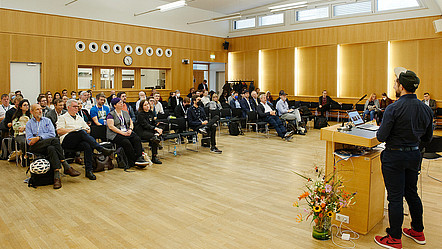The Erasmus+ Project TrainDL at the INFORMATIK 2022
On September 29, at the INFORMATIK 2022 (Sept. 26-30, 2022), the annual conference of the German Informatics Society (GI), a one-and-a-half-hour educational session was prepared and conducted by the TrainDL team.
The primary goal of the TrainDL Talk series is always to look outside the box: on the one hand, to look at Europe as a whole, but also at the conditions under which data literacy and AI education is possible. For this enriching outside view, host Elisabeth Schauermann (GI, TrainDL team) had exciting scientists from three European countries as guests at the TrainDL session.
In the opening keynote "Informatics - A Fundamental Discipline for the 21st Century", Michael E. Caspersen (Aarhus University), who is currently also Special Advisor to Executive Vice President Margrethe Vesthager in the European Commission for Digital Education and Skills, gave an insight into his thoughts on the subject of informatics as a foundation for work in other sciences. Computer science as another language to express yourself in. Equal to mathematics and next to language in both speech and writing, computer science stands as a form of expression, a problem-solving tool, and thus changes the way we work in all subjects.
After that, Kate Farell (University of Edinburgh) gave an input, explaining how she and her colleagues are working to make data a tangible experience in all school subjects and to strengthen these competencies in students outside of computer science classes. This included examining all Scottish primary and lower secondary curricula and identifying possible entry points for data literacy development, as well as providing examples and concrete guidance on how to achieve this. Developing connecting points and contextualisation for other school subjects (besides computer science) is also the groundwork for the next TrainDL teacher training sessions and materials that will be targeted at non-computer science teachers in the next stage of the project.
In a second input, Andreas Dengel (Goethe University Frankfurt) presented the trial of a new subject that has just been started in Hessen, which, in addition to a strong informatics focus, is also intended to strengthen students' application and reflection skills. Particularly with regard to the contextualisation of computer knowledge, he sees data skills as fundamental, since data in many forms change the everyday lives of every human being. The subject "Digital World," which is now being tested for a year, is intended to enable computer literacy as early as fifth grade and to create action-oriented approaches, particularly through projects. For example, an understanding of basic algorithmic principles and fundamental data skills should help to facilitate intersections with social issues of sustainability.
The training courses and, above all, the materials developed in the TrainDL project would also be valuable for further work on the subject, Dengel said. In this way, teachers in Hessen who are currently trying out the subject could benefit from the concepts and materials developed in TrainDL and integrate them into their lessons.
Elisabeth Schauermann from the TrainDL team summed up at the end of the panel that digital competencies, data and AI will become increasingly important across all subjects and that in the future, therefore, all teachers will need access to informatics competence building.
If you are interested in the contributions of Michael E. Caspersen, Kate Farrell or Andreas Dengel, please contact annasarah.lieckfeld@gi.de.

